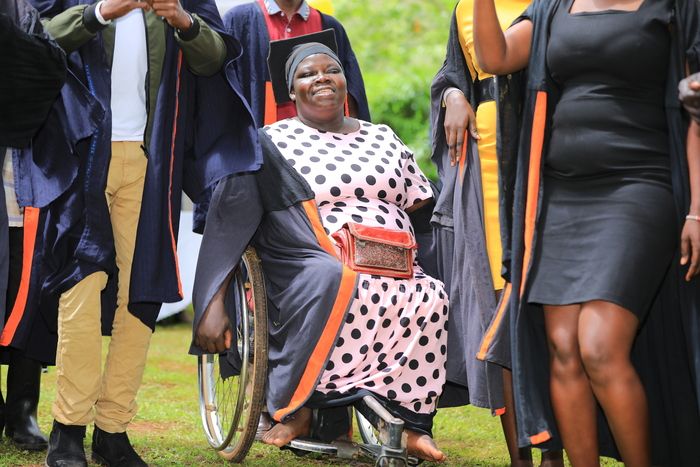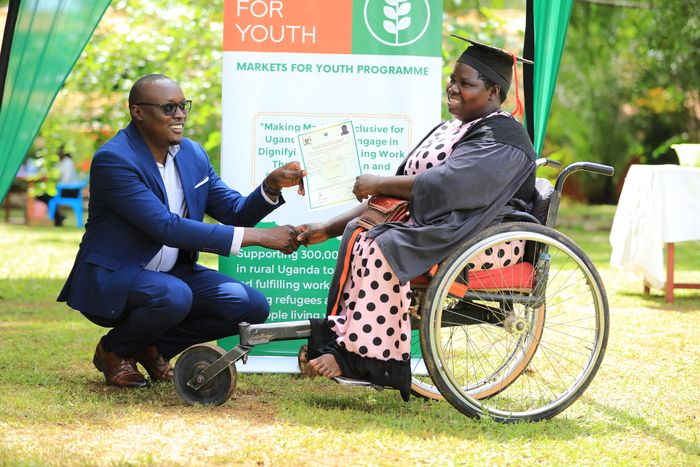 Stories
Stories
December 3, 2023 • 3 min read
December 3rd is International Day of Persons with Disabilities. Betty is a mother of four who lives with a disability in Bazza Village, Moroto District, Uganda. She has used a wheelchair since she was seven-years-old. Before being introduced to the Markets for Youth programme, Betty sold clothes and occasionally farmed produce for personal consumption in order to support her family. Then, she received training from AgroMax, an agri-business company and one of Market for Youth's skills development partners.
Markets for Youth Programme
Uganda has one of the youngest populations in the world, with more than 75% of people below the age of 30. The country has one of the highest youth unemployment rates in Sub-Saharan Africa at 13.3%. GOAL is partnering with the Mastercard Foundation to help 300,000 young Ugandans, aged 16-35, access dignified and fulfilling employment over the next five years. 15,000 young people living with disabilities are set to benefit from the programme.
“The training opened my eyes. I was trained in planting crops like onions, cabbage, and eggplants. I earn an income from these vegetables and can pay school fees and rent,” Betty says. Betty is now a youth lead extensionist for AgroMax, who trains other disabled youth in good agricultural practices.
“Agriculture is not popular among the youth in Moroto because the region is vulnerable to drought. But the youth group was very positive, and I trained them in planting vegetables which are delicate, and they have had great produce. They managed to irrigate the crops well.” The youth group has also received training in financial literacy and management and now operates a Village Savings and Loan Association (VSLA).

Betty attending her Young Africa Works: Markets for Youth Programme graduation
Hard Work Inspiring Others
One youth, Johnson, is a member of the youth group. He says he is inspired by Betty’s leadership and hard work, especially in view of her disability. “I learnt how to grow vegetables from her. We used to fail with our crop, due to lack of proper crop management. Skills like starting with a nursery bed and applying chemicals were new to us. I can now manage a nursery bed and transfer the seedlings for planting,” he says happily. “I now believe that [people with disabilities] can do better, and we just need to make our environment inclusive for them.”
Mark, another member of the youth group living who has a visual impairment, says he is so happy about the transformation that the programme brought in Moroto. “Many trainings don’t give us hands-on skills, but this one was different. I was happy to also receive seeds, and I am very prepared for the coming rain to plant in large quantities,” he says optimistically. Mark also enrolled his daughter in the programme. “Since I am a father with youth at home, and this programme is targeting young people, I sent my daughter in, and she has benefited from the programme.”
An Inclusive Future
Back at home, Betty’s daughter Agatha is very glad that her mother took on horticulture as a practice because it has not only improved their nutrition at home but also improved their standard of living. “Since Mummy started growing vegetables, we have a balanced diet. Although she lives with a disability, she provides our rent and food, and is also able to send us to school. She also takes care of four other children from our relatives. Many people around our village come to her to learn how to grow vegetables as well.”
Betty also currently doubles as the female representative of people living with disabilities in her municipality. She believes that empowering people living with disabilities to participate actively in their community and form a collective voice is the best way to build a more inclusive future. By engaging with their communities and local initiatives, young people can take the lead in transforming agriculture. Betty is hopeful for the future with ambitious plans to buy her own land and an irrigation system.
“Agriculture is the backbone of the Ugandan economy, and we can change our family lives and communities through farming, if we do it the right way,” Betty concludes.
You can support GOAL’s work with young people like Betty with a donation today.

Betty graduating from the Young Africa Works: Markets for Youth Programme
